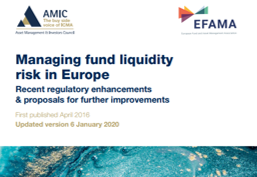EFAMA welcomes the opportunity of this consultation report to share views on how regulators could foster greater consistency in the management of liquidity risks in the Open-Ended Funds (OEFs) sector and on how the FSB should proceed in the future to evaluate any potential build-up of systemic risks in capital markets.
Financial stability
At the international level the FSB, together with IOSCO, are responsible for implementing policies that address structural vulnerabilities arising from asset management activities. Several regulatory actions have been taken to ensure the resilience of the asset management sector since the global financial crisis. The EU’s current risk management regime has recently been put to the test by the Covid-19-led market stress, proving its overall resilience.
Future regulation should be targeted, risk-based and reflect the differing risk profiles of Non-Bank Financial Institutions (NBFI) entities and activities. EFAMA and its members are committed to working closely with international and European regulators on the ongoing improvement of investment funds’ existing risk management framework, and to foster the development of best practices within the investment management industry.
FSB Consultation Report on addressing vulnerabilities from liquidity mismatch in open-ended funds
EFAMA's and ICMA’s AMIC joint response on fund liquidity management by open-ended funds to IOSCO
ICMA’s AMIC and EFAMA have submitted a joint response to the IOSCO consultation on fund liquidity management by open-ended funds.
The response highlights how industry practices and existing regulatory provisions in Europe are well aligned with the Liquidity Risk Management (LRM) recommendations issued by IOSCO in 2018 (Annex 1).
Industry Association Letter on Impact of COVID-19 on Initial Margin Phase-In
Clear view of risks needed before introducing new macroprudential policies for EU capital markets
European Commission must ensure they don’t hinder much-needed EU investment
Following recent market disruptions such as the COVID-19 pandemic and the UK gilt market crisis, the European Commission is reviewing the adequacy of macroprudential policies for non-bank financial intermediation (NBFI). In July 2024, they launched a consultation to determine whether the EU should repurpose specific micro-prudential instruments or introduce new macroprudential requirements.
EFAMA responds to EC consultation on adequacy of macroprudential policies for NBFI
In its response to the Commission’s consultation on assessing the adequacy of macroprudential policies for NBFI, EFAMA stresses that Europe needs more holistic and rigorous analyses to determine where financial stability risks lie. Unfortunately, even though investment funds have proven resilient in recent years despite frequent market disruptions, the consultation focuses on the asset management industry.
EBA & ESMA discussion paper on the Commission’s call for advice on the prudential framework for investment firms
Open-ended funds and resilient capital markets - the perspective of the European asset management industry
For the best part of this decade, macro-prudential supervisors have argued that investment funds contribute to the build-up of systemic risks. Today, EFAMA has published an ambitious report that provides a comprehensive overview of the contribution of the European investment fund sector to the diversity and resilience of capital markets.
Some key findings include:
EFAMA Market Insights | Issue #2 | MMFs in Europe | State of Play
The growth in MMF net assets occurred against the backdrop of resolute actions by governments and monetary authorities
across the world to mitigate the impact of the Covid-19 crisis.
AMIC EFAMA Report - Managing fund liquidity risk in Europe - 2020
In 2019, AMIC and EFAMA decided to update their 2016 report “Managing Fund Liquidity Risk in Europe” following important policy and regulatory developments at EU and international levels. The purpose of this updated report is to outline the practical liquidity risk management processes which fund management companies put in place when setting up a fund and implement throughout the life of the fund. Also, the report describes the existing European and international regulatory frameworks in the area of fund liquidity risk management.

































